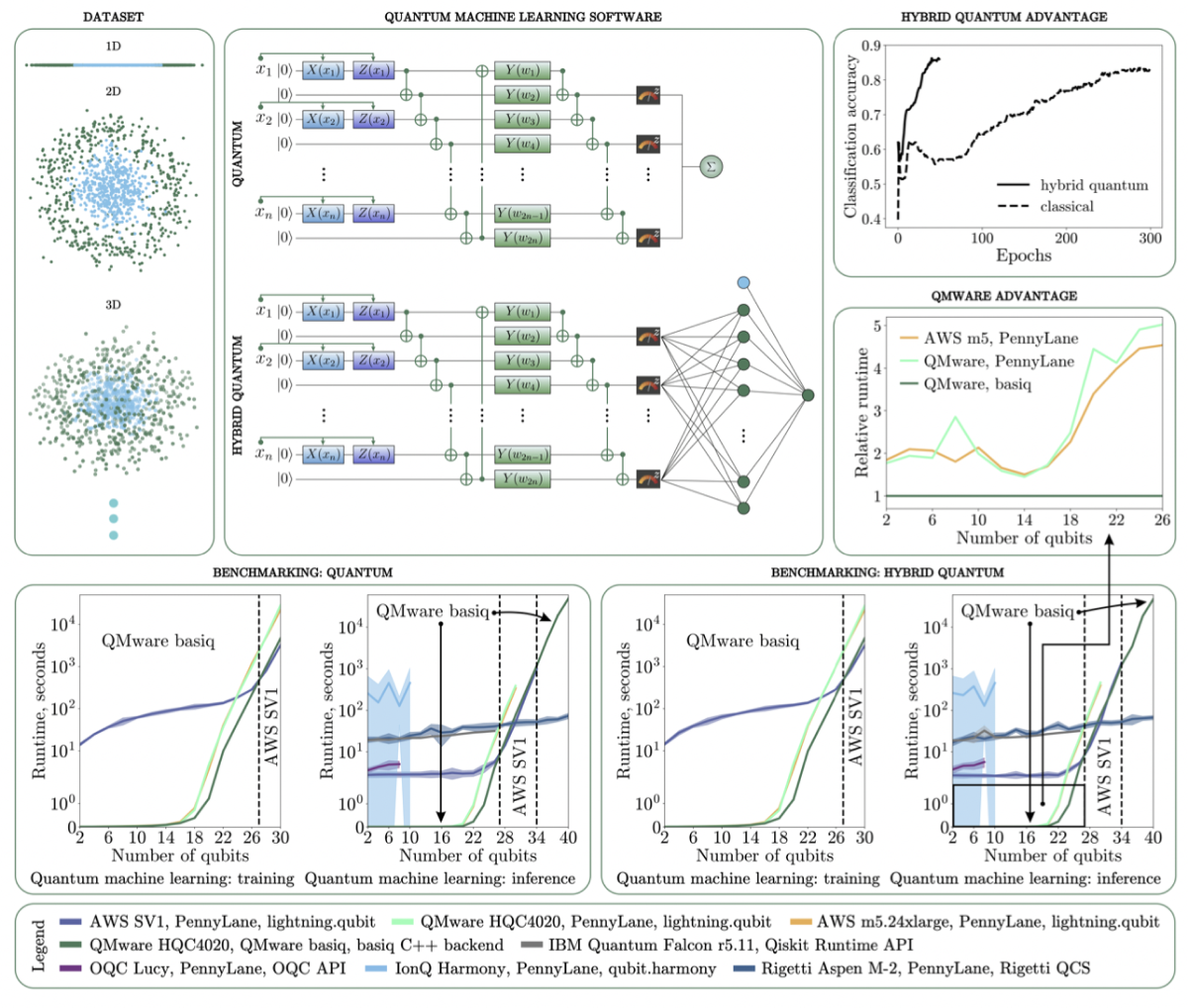- Research shows that, as of today, the combination of simulated quantum processors and classical high-performance computers (hybrid approach) delivers highest-quality and most cost-efficient results compared to available native quantum computers
- Ongoing study benchmarks speed, cost, and result quality of publicly available native quantum processors from IonQ, Rigetti, Oxford Quantum Circuits and IBM, as well as simulated quantum processors from QMware and Amazon Braket
- The integration of classical high-performance computers and simulated quantum processors could accelerate broad industry adoption of the hybrid quantum approach to cost-effectively future-proof businesses
St. Gallen, 07 December 2022 - Terra Quantum, a leading quantum technology company, today announced that it has conducted a comprehensive benchmark of publicly available simulated and native quantum computing platforms. The goal of the study was to investigate how the prediction accuracy and training time of quantum neural networks can be improved by utilizing a hybrid quantum-classical approach. The benchmark found that the combination of simulated quantum processors and classical high-performance computers delivers the best performing, most cost-efficient, and robust approach.
The first benchmark was finalized on 25th November 2022 and covers a variety of publicly available native and simulated quantum computing devices (including IonQ, Rigetti, Oxford Quantum Circuits, IBM, QMware and Amazon Braket). As the study was focused on real-life application, it deliberately excluded systems that are exclusive or still at an experimental stage . Terra Quantum plans to continuously benchmark and extend the study accordingly as the technology matures.
“Terra Quantum’s benchmark delivers reliable insights for anyone evaluating the implementation of quantum computing to efficiently utilize quantum technology benefits today and prepare for the quantum future,” says Markus Pflitsch, CEO and Founder of Terra Quantum. “We aim to continuously provide leaders in relevant industries and industry experts with up-to-date insights for the ideal application of the technology. The presented results are a gamechanger for greater industry adoption.”
The benchmarking exercise examined the combination of speed, running cost and result quality of the performance of publicly available quantum computing power. The results demonstrated that a combination of simulated quantum processors and classical high-performance computers (hybrid approach) provided currently the most time- and cost-efficient quantum algorithm training solution. This delivers valuable insights for early industry adopters when evaluating the most efficient use of quantum computing technology. Training the quantum neural networks on a simulated quantum processor avoids the cost-intensive reruns necessitated by frequent calculation errors that arise with native quantum processors. Today’s error-prone native quantum processors reduce the functional capacity of large physical qubit counts to only a few utilizable qubits. Overcoming these errors is currently the greatest challenge facing native quantum processor providers. Simulated quantum processors provide up to 40 error-free (so-called algorithmic) qubits, enabling complex quantum-enhanced problem solving today. QMware offers up to 40 and AWS SV1 up to 34 simulated qubits.
“We found that only a combination of simulated or native qubits with classical high-performance computing power delivered competitive runtime results in comparison to purely classical approaches with today’s technologies at hand,” said Georg Gesek, CTO and co-Founder of QMWare. “The benchmark further highlights that training algorithms utilizing simulated qubits prove to be the only commercially viable option today as it they are still cheaper and more accurate compared to using native quantum processors.”
Gesek continued: “For algorithms requiring fewer than 30 qubits, they delivered even faster results than their native counterparts. The QMware simulated QPU is to date the fastest publicly available option for algorithms requiring below 27 qubits. In the benchmark, QMware’s soft- and hardware platform processed the data 78% faster than the second best.”
Even a relatively modest amount of native quantum processing power has the potential to boost the computational capabilities of a hybrid quantum-classical device. Researchers suggest that the integration of simulated and native quantum processors with high-performance computers offers enticing prospects. This could accelerate the early adoption of quantum computing power for commercial use across a variety of industries such as telecommunications, logistics, finance, automotive and energy.
“Quantum algorithms are best when run on a specialized hardware and software combination that optimizes multithreading and RAM utilization,” said Dr. Alexey Melnikov, Head of Quantum Machine Learning at Terra Quantum. “This highlights the essential need for cloud platforms like QMware that can execute algorithms with up to 40 qubits. As for the physical QPUs, we expect a practical advantage with quantum machine learning once physical devices with 30 qubits have sufficient quality.”
The full study is publicly available on arXiv under the following link: “Benchmarking simulated and physical quantum processing units using quantum and hybrid algorithms”

[1] QPUs: IonQ Harmony, Rigetti’s Aspen M-2, Oxford Quantum Circuits’ OQC Lucy and IBM Falcon r5.11
[2] Simulators: AWS m5.24xlarge, AWS SV1 and QMware HQC4020
[3] For example: Simulators such as IBM simulator statevector and ATOS Quantum Learning Machine; QPUs such as IBM's Eagle processor, Honeywell's System Model H1, and Google's Sycamore processor; and quantum simulating backends such as the IBM Qiskit machine learning suite and the Qulacs package.